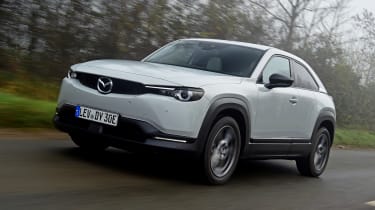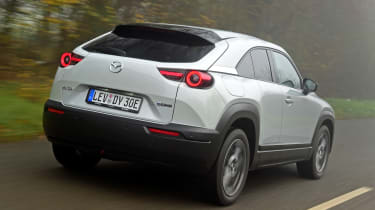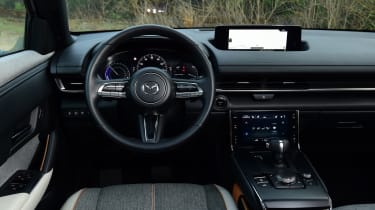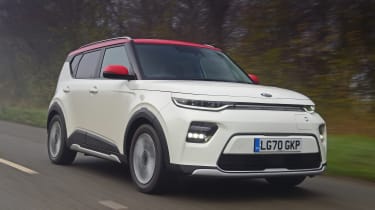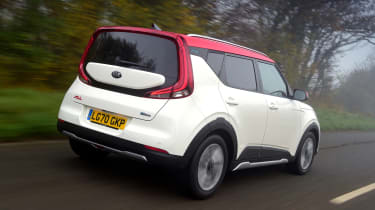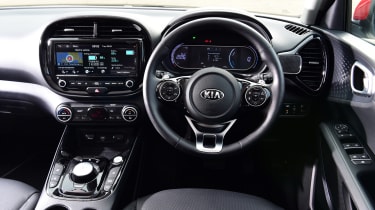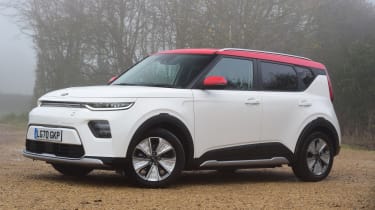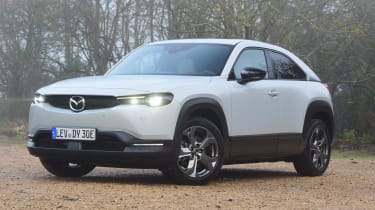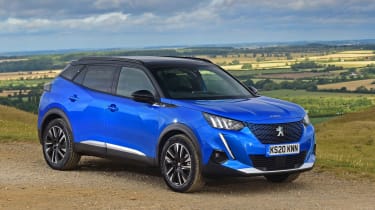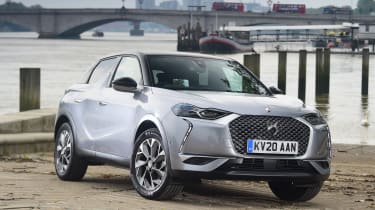Mazda MX-30 vs Kia Soul EV
We find out how the new Mazda MX-30 stacks up to one of the best electric SUVs on sale - the Kia Soul EV
Look through Mazda’s history and it’s littered with unusual innovations, such as the rotary engine. More recently its SkyActiv-X tech has seen it shun small petrol turbo units in favour of a clever combustion process to boost torque.
But even Mazda isn’t immune from the trend towards electrification, and this is its first car for a new era, the all-electric MX-30. It’s a small, stylish SUV costing around £30,000 in the spec we’re testing. Yet the market is crowded in this sector and around this price point, and with the Mazda’s obviously quirky styling there’s one clear rival: the Kia Soul EV.
We know how good Kia’s slightly more left-field alternative to the brand’s more conventional e-Niro is, so it’s a natural fit against the Mazda. It has lots of range and solid tech, so while the Kia is pricier, these two fight it out on similar fronts.
With the announcement that the UK is bringing forward its ban on the sale of new petrol and diesel cars to 2030, this electric pair will influence the brands’ offerings in a decade’s time, but which one is the best buy right now?
Mazda MX-30
| Model: | Mazda MX-30 GT Sport Tech |
| Price: | £29,845 (after £3,000 Plug-in Car Grant) |
| Powertrain: | 1x e-motor/lithium-ion battery |
| 0-62mph: | 9.7 seconds |
| Test economy: | 3.2 miles/kWh |
| CO2: | 0g/km |
| Annual road tax: | £0 |
This is Mazda’s all-new EV, the MX-30. We’ve had access to an early left-hand-drive car, which is representative of GT Sport Tech trim. It’s priced from £29,845 after the £3,000 Government grant.
Used - available now

2023 Land Rover
Range Rover Evoque
29,191 milesAutomaticDiesel2.0L
Cash £31,750
2020 Kia
Stonic
23,695 milesAutomaticPetrol1.0L
Cash £13,106
2021 Ford
Mustang Mach-E
24,663 milesAutomaticElectric
Cash £23,500
2020 BMW
1 Series
48,003 milesManualPetrol1.5L
Cash £15,897Design & engineering
A quick look at the Mazda’s on-paper spec highlights one potential sticking point already. The MX-30 boasts only a 35.5kWh battery (just 30kWh of which is usable), which is more in line with what electric city cars such as the Honda e and MINI Electric use.
Mazda says the battery is right-sized and there’s no need for more capacity, because the MX-30’s 124-mile claimed range easily exceeds the 31-mile average daily mileage most European motorists rack up.
The battery is nestled in the floor of the chassis, which is based on the same architecture as the new Mazda 3 and CX-30, but for the MX-30 EV the area around the battery pack and the floor has been strengthened to increase its rigidity. This should help with driving dynamics and crash safety.
Power is sent to a motor mounted on the front axle – called e-SkyActiv – which produces 143bhp and 271Nm of torque. This is enough grunt, but still less than the Kia. Despite its power deficit, the Mazda is 37kg lighter than the Soul EV, so it has a slight weight advantage, which should help it dynamically. This will also be boosted by Mazda’s adaptation of its clever G-Vectoring Control system for the electric motor, which reduces torque on turn-in more quickly than with an ICE engine to help agility.
The MX-30 boasts some other unusual engineering features, too. The design is obviously funky, just like the Soul EV’s, and that’s reinforced by the Mazda’s rear-hinged back doors, which open the opposite way to normal. The structural B-pillar is integrated into the rear door on each side.
There are also some other nice design touches inside. The textures, colours and materials of our car’s interior were lovely. On the centre console there are some cork panels, too – a nod to Mazda’s past; it started life as a cork-making company in 1920 before it diversified into engineering seven years later.
Driving
The MX-30’s relationship to the Mazda 3 hatch and the CX-30 is obvious, because it drives just as sweetly as its siblings. The steering is exactly the right speed and weight – it’s some of the nicest steering we’ve tried in any EV this side of the Porsche Taycan.
Despite the rather portly kerbweight, the Mazda’s body control is good and it feels pretty well tied down in corners, without too much lean. It’s much more involving than the Kia. Yet they’re closer when it comes to ride quality. Both have a plush feeling to the way they deal with speed bumps in town, as well as the usual road rubbish you find in urban areas. On country lanes and motorways it’s enjoyable, too.
The benefit of an electric motor is that, even with a relatively modest 143bhp and 271Nm of torque compared with the Kia’s higher output, it’s delivered smoothly when you ask for it. Performance is adequate and better than a similarly rated ICE car.
The 0-62mph sprint takes 9.7 seconds, which is slower than the Kia, granted, but it’s from 0-30mph where the MX-30 is best anyway. On the motorway it’s still refined, but use the performance or travel at faster speeds and range is depleted quickly.
Practicality
The MX-30 is actually longer than the Kia, with a longer wheelbase, too. While there’s 341 litres of boot space with the seats up (26 litres more than in the Kia), the Mazda is much more compromised for room in the rear of the cabin.
Those nicely engineered rear doors are very small, and open in a reverse direction to normal, while the aperture to get into the back is tight. There’s an average amount of room in the rear, but the seat base isn’t that deep and the tapering roofline means headroom isn’t as good as in the boxier Kia.
There are enough bins and cubbies for storage, but as nice as the cork inlays are, we’d worry about the material’s longevity if you put keys and coins in there. It’s perilously close to the cup-holder, too.
Ownership
Mazda recorded a good result in our Driver Power 2020 poll, taking fourth spot out of 30 brands. It was in the running with Kia here, but its dealers finished at opposite ends of the table, with Mazda’s taking 27th place.
The MX-30 in GT Sport Tech trim gets lots of safety kit, though, and was recently awarded a full five-star Euro NCAP safety rating. Autonomous braking (including reverse) with cross-traffic alert front and rear, lane-departure warning and lane- keep assist, blind-spot monitoring, adaptive cruise, front and rear parking sensors and a 360-degree around view monitor are all standard.
Running costs
Despite having a more limited range than the Kia, the newer Mazda’s predicted residual values are slightly higher, according to our experts.
If you’re a cash buyer, you can expect the MX-30 to retain 46.9 per cent, which equates to depreciation of £15,851. While the Soul EV will lose more, at £18,341 over the same three years/36,000 miles, it’s a more expensive car to begin with, so with a rating of 46.5 per cent, the difference between the two in percentage terms is hardly anything.
The beauty of running an electric vehicle this tax year is that they attract a zero-per-cent company car tax rate, so you won’t pay anything to the Treasury to run one of these models. They’re also both free when it comes to Vehicle Excise Duty.
Testers’ notes
“The ‘MX’ prefix has traditionally been reserved for cars that ‘challenge perceptions’, according to Mazda. That’s why this EV is called the MX-30, not because it’s related to the sporty MX-5 in any way.”
Kia Soul EV
| Model: | Kia Soul EV First Edition |
| Price: | £34,295 (after £3,000 Plug-in Car Grant) |
| Powertrain: | 1x e-motor/lithium-ion battery |
| 0-62mph: | 7.6 seconds |
| Test economy: | 3.9 miles/kWh |
| CO2: | 0g/km |
| Annual road tax: | £0 |
The Soul EV is one of our favourite all-electric compact SUVs, and it has many similarities with the Mazda, as well as many differences. However, at £34,295 for this First Edition trim (the only option), is it worth the extra?
Design & engineering
We know the Soul EV’s make-up by now. It’s already won two Auto Express road tests, and it’s looking to make it a hat-trick here.
Compared with the Mazda, a quick analysis of the powertrain looks positive, because with a 64kWh usable battery pack, the Soul EV’s cells are significantly more energy-dense than the MX-30’s, and this has a huge bearing upon claimed range.
Yes, the Kia is £4,450 more expensive than the Mazda as a cash buy (this gap isn’t so significant if you buy on PCP), but with a claimed range of 280 miles from its battery, it easily offers more than double what the Mazda does. The charging capability is superior, too.
Not only is the Korean car equipped with a bigger battery, but it also sends that energy to a more powerful front-mounted electric motor, which offers 201bhp and 395Nm of torque. Despite it weighing more than the MX-30, the Soul EV has more than enough performance to overcome this drawback.
There’s a similarly left-field approach to the car’s styling, with a quirky look that’ll no doubt be divisive, just as the MX-30’s looks could be, too. Yet inside, the Kia is much blander, with more black plastic that doesn’t match the quality of the Mazda’s mix of textures and materials, which also help to lift the cabin design. This is despite the Kia costing more.
It’s still trimmed well enough, though, with features such as heated leather seats and a great infotainment unit, so there are lots of creature comforts and technology to play with.
Driving
The Kia isn’t quite as fun to drive as the Mazda, but it’s faster. The 0-60mph sprint takes 7.6 seconds, but what you really need to know is that with more power and torque, the Soul EV is snappier to respond when pulling away and going for an overtake. There’s more performance, and with a greater predicted range you can use it more of the time without fear of depleting the battery as much or as quickly.
The instant torque makes it a good town car, too, while the ride backs this up. It doesn’t feel quite as taut or as well controlled as the Mazda, but the suspension has a slightly more supple edge, so the Kia also responds to bumps in town with a soft touch.
This isn’t at the expense of stability through faster bends, because it feels totally secure here and on the motorway. Like its test rival, a lack of engine noise means refinement is good, but the Soul EV just edges the MX-30 when it comes to wind and road noise.
You definitely don’t develop the same connection with the car as you do in the Mazda, but arguably customers buying cars like these are less bothered about this and want something that’s easy to drive, efficient and can cover plenty of miles on a charge. At least one of the benefits of the Kia’s lighter steering is that it’s easy to manoeuvre.
Practicality
Much better visibility is a benefit when manoeuvering, too. While the Mazda has rear-hinged doors with tiny windows that limit over-the-shoulder visibility, there’s no such trouble with the Kia. But the Soul EV also has front and rear parking sensors and a rear-view camera to help in any event.
It’s slightly down on boot space compared with the Mazda, offering only 314 litres, but this is just enough for a family’s luggage. The boxy boot and flat tailgate also mean the Kia should be easy to pack.
Fold the seats down and there are 1,339 litres available, compared with 1,146 litres in the Mazda. This also highlights the room in the rear of the cabin, where the Kia’s boxy shape and tall roofline combine to offer impressive headroom. This is backed up by superior legroom as well.
It doesn’t boast the little details like the MX-30’s cork and the cool grey fabric, but there’s still plenty of storage inside the admittedly slightly dull interior.
Ownership
The Kia strikes back with strong results in our Driver Power 2020 survey. The brand took second overall, while its dealers finished fifth – plus you get a seven-year/100,000-mile warranty on the Soul; Mazda’s package is limited to three years/60,000 miles.
There’s a similar level of safety kit to the MX-30, with autonomous braking, collision warning, lane- keep assist, blind-spot monitoring, lane-follow assist as part of the semi-autonomous adaptive cruise control, plus high-beam assist for the LED headlights, so safety should be strong.
Running costs
It was cold during our test, but the Mazda only managed 3.2 miles per kWh at best, driving carefully. The Kia easily recorded 3.9 miles per kWh without many concessions to super-efficient driving.
Based on these figures and a usable battery capacity of 30kWh, the Mazda’s predicted real-world range is just 96 miles. This is very poor, especially compared with the Soul’s predicted real-world range of 250 miles from a full charge. The Kia’s computer tends to show one mile of energy used for one mile travelled. It’s far from this relationship in the Mazda.
Yet the MX-30 will still be incredibly cheap to run compared with an ICE SUV. It will cost £488 a year in home charging costs (based on 12,000 miles travelled), while the Soul EV will only cost £400, making it nearly 20 per cent cheaper to run.
Testers’ notes
“The Kia’s charging point is offset on the nose, while the MX-30’s flap is located on the right rear wing. This could have an impact on where you locate your home wallbox or when parking at a public charge point.”
Verdict
First place: Kia Soul EV
Thanks to its much bigger battery that gives a much more usable range, its more impressive recharging capability and the fact it’s more spacious inside, the Kia is a clear winner. It’s more efficient, too, so will be cheaper to run, plus it rides sweetly, is refined, handles well enough and is quicker than the MX-30. The Soul EV lacks the Mazda’s individual details, but we’d happily take the extra usability instead.
Second place: Mazda MX-30
Given its poor real-world range, the MX-30 only makes sense as a second car, but it’s an expensive one at that. It isn’t very practical, nor is it as fast or as efficient as the Kia. We like the interior and the materials, but the MX-30 lacks the Soul EV’s versatility and usability in most areas, including range, charging and space. It rides and handles nicely and is refined, but that’s far from enough to beat the Kia.
Also consider...
Peugeot e-2008
- Model: Peugeot e-2008 Active Premium
- Price: £29,895
- Power/batt: 134bhp/50kWh
If you’re after an electric SUV with style then take a look at the Peugeot e-2008. It has a similar level of power to the Mazda but with more space - and more range, at 206 miles (claimed) from its larger 50kWh battery.
DS 3 Crossback E-Tense
- Model: DS 3 Crossback E-Tense P’mance Line
- Price: £30,990
- Power/batt: 134bhp/50kWh
The DS definitely does things a little differently, like the Mazda. It has the same powertrain as the e-2008, but places more focus on individual design – albeit at the expense of practicality. Quality isn’t as good as the MX-30 either.
Figures
| Kia Soul EV First Edition | Mazda MX-30 GT Sport Tech | |
| On the road price/total as tested | £34,295/£34,295 | £29,845/£30,395 |
| Residual value (after 3 yrs/36,000) | £15,954/46.5% | £13,994/46.9% |
| Depreciation | £18,341 | £15,851 |
| Annual tax liability std/higher rate | £0/£0 | £0/£0 |
| Annual electricity cost (12k/20k miles) | £400/£667 | £488/£813 |
| Insurance group/quote/road tax cost | 34/£591/£0 | TBC/TBC/£0 |
| Servicing costs | £239 (3 years) | TBC |
| Length/wheelbase | 4,195/2,600mm | 4,395/2,655mm |
| Height/width | 1,605/1,800mm | 1,555/1,795mm |
| Powertrain | 1x electric motor/lithium-ion battery | 1x electric motor/lithium-ion battery |
| Peak power/revs | 201/3,800 bhp/rpm | 143/TBC bhp/rpm |
| Peak torque/revs | 395/1 Nm/rpm | 271/TBC Nm/rpm |
| Transmission | Single-speed auto/fwd | Single-speed auto/fwd |
| Battery capacity/usable | 67.1/64kWh | 35.5/30kWh |
| Boot capacity (seats up/down) | 315/1,339 litres | 341/1,146 litres |
| Kerbweight/payload/towing capacity | 1,757/423kg/N/A | 1,720/399kg/N/A |
| Turning circle | 10.6 metres | 10.6 metres |
| Basic warranty (miles)/recovery | 7 years (100,000)/1 yr | 3 years (60,000)/3 yrs |
| Driver Power manufacturer/dealer pos. | 2nd/5th | 4th/27th |
| NCAP: Adult/child/ped./assist/stars | TBC | 91/87/68/73/5 (2020) |
| 0-62mph/top speed | 7.6 secs^/104mph | 9.7 secs/87mph |
| Auto Express economy | 3.9 miles/kWh | 3.2 miles/kWh |
| Auto Express predicted range | 250 miles | 96 miles |
| Claimed range (WLTP) | 280 miles | 124 miles |
| Charging capability | 2.2/7.2/50/100kW | 2.4/6.6/50kW |
| Charging time | 31hrs/9hrs35mins/1hr15mins/54mins | 15h8m/5h/36m |
| Actual/claimed CO2/tax bracket | 0/0g/km/0% | 0/0g/km/0% |
| Airbags/Isofix/parking sensors/cam. | Seven/yes/F&R/yes | Six/yes/F&R/yes |
| Auto box/lane keep/blind spot/AEB | Yes/yes/yes/yes | Yes/yes/yes/yes |
| Climate control/cruise control | Yes/adaptive | Yes/adaptive |
| Leather upholstery/heated seats | Yes/yes | No/yes |
| Met paint/LEDs/keyless/pwr tailgate | Yes/yes/no/no | £550/yes/yes/no |
| Nav/digital dash/DAB/connected apps | Yes/yes/yes/yes | Yes/yes/yes/yes |
| Wireless charge/CarPlay/Android Auto | Yes/yes/yes | No/yes/yes |


